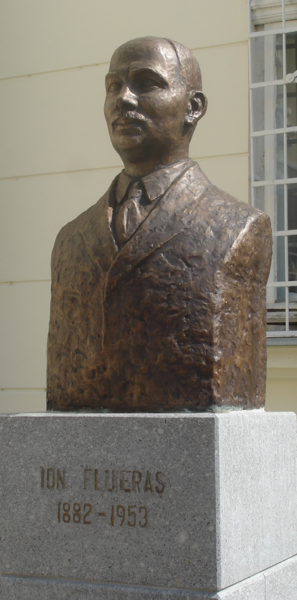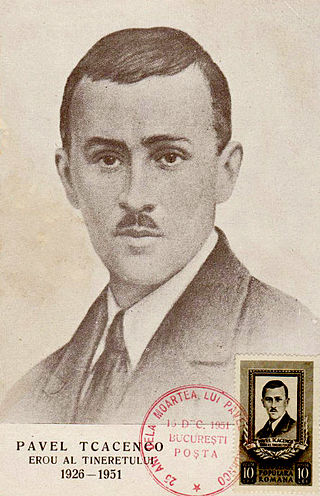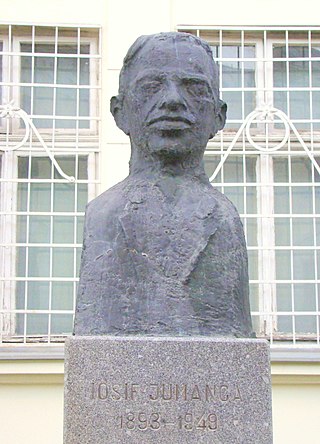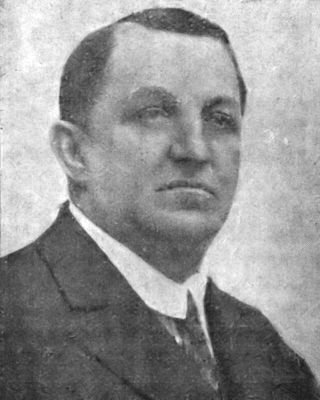Related Research Articles

The Germans of Romania represent one of the most significant historical ethnic minorities of Romania from the modern period onwards.

Gheorghe Cristescu was a Romanian socialist and, for a part of his life, communist militant. Nicknamed "Plăpumarul", he is also occasionally referred to as "Omul cu lavaliera roșie", after the most notable of his accessories.
The Romanian Social Democratic Party was a social-democratic political party in Romania. In the early 1920s, the Socialist Party of Romania split over the issue of affiliation with the Third International. The majority, which supported affiliation, evolved into the Communist Party of Romania in 1921, while the members who opposed the new orientation formed various political groupings, eventually reorganizing under a central leadership in 1927. From 1938 to 1944, the party was outlawed but remained active in clandestinity. After 1944, it allied with the Communists and eventually was forced to reunite with them to form the Workers' Party of Romania in 1948. It published the magazines Socialismul, Lumea Nouă, and Libertatea. After the end of the Communist single-party system in 1989, a group of former members created a new party which proclaimed itself the direct descendant of the PSD.
The Romanian National Party, initially known as the Romanian National Party in Transylvania and Banat, was a political party which was initially designed to offer ethnic representation to Romanians in the Kingdom of Hungary, the Transleithanian half of Austria-Hungary, and especially to those in Transylvania and Banat. After the end of World War I, it became one of the main parties in Romania, and formed the government with Alexandru Vaida-Voevod between November 1919 and March 1920.

IoanFlueraș was a Romanian social democratic politician and a victim of the communist regime.
Eugen Rozvan was a Hungarian-born Romanian communist activist, lawyer, and Marxist historian, who settled in the Soviet Union late in his life and was executed during the Great Purge.

The union of Transylvania with Romania was declared on 1 December [O.S. 18 November] 1918 by the assembly of the delegates of ethnic Romanians held in Alba Iulia. The Great Union Day, celebrated on 1 December, is a national holiday in Romania that celebrates this event. The holiday was established after the Romanian Revolution, and celebrates the unification not only of Transylvania, but also of Bessarabia and Bukovina and parts of Banat, Crișana and Maramureș with the Romanian Kingdom. Bessarabia and Bukovina had joined with the Kingdom of Romania earlier in 1918.
The Socialist Party of Romania was a Romanian socialist political party, created on December 11, 1918 by members of the Social Democratic Party of Romania (PSDR), after the latter emerged from clandestinity. Through its PSDR legacy, the PS maintained a close connection with the local labor movement and was symbolically linked to the first local socialist group, the Romanian Social-Democratic Workers' Party. Its creation coincided with the establishment of Greater Romania in the wake of World War I; after May 1919, it began a process of fusion with the social democratic groups of in the former territories of Austria-Hungary — the Social Democratic Parties of Transylvania, Banat and Bukovina. The parties adopted a common platform in October 1920. Progressively influenced by Leninism, the PS became divided between a maximalist majority supporting Bolshevik guidelines and a reformist-minded minority: the former affiliated with the Comintern as the Socialist-Communist Party in May 1921, while the minority eventually established a new Romanian Social Democratic Party.
The German Party was a political party in post-World War I Romania, claiming to represent the entire ethnic German community in the country, at the time it was still a kingdom.

Pavel Tcacenco or Tkachenko was an Imperial Russian-born Romanian communist activist, a leading member of the communist movements of Bessarabia and Romania in the 1920s.
Ghiță Moscu was a Romanian socialist and communist activist, one of the early leaders of the Romanian Communist Party and its permanent delegate to the Third International. He was executed in the Soviet Union during the Great Purge.
Elections for 680 of the 1,228 delegates to the Great National Assembly of Alba Iulia took place in Transylvania and neighbouring regions of the Hungarian Democratic Republic inhabited by Romanians between November 20 and December 1, 1918. Called by the National Romanian Central Council, the elections were open exclusively to ethnic Romanians, with women excluded from the process in most of the places. Voting procedure was highly irregular, ranging from universal vote direct vote to indirect elections and even acclamation by local self-proclaimed "Romanian national councils".
The Banat Socialist Party was a political party in the Banat, Romania. The party was founded by social democratic branches in Banat on September 19, 1919, as the Banat Social Democratic Party. In December 1919, the party merged with the Social Democratic Party of Transylvania, but retained its autonomy. The name Banat Socialist Party was adopted at a party conference on May 2, 1920. The party was affiliated to the Federation of Socialist Parties in Romania.

Alexandru Nicolau was a Romanian lawyer, socialist and later communist activist. Active in the Romanian and French socialist movements before and during World War I, he left for Russia during the 1917 Revolutions. There, he became one of the organisers of Romanian volunteer detachments in support of the Soviets. Arrested shortly after returning to Romania in 1920, he left for Soviet Russia after a successful prison escape. During the later part of his life he held teaching positions at several Soviet universities, before falling victim to the Great Purge in 1937. His name was posthumously rehabilitated both in the Soviet Union and in his native Romania.

Iosif Jumanca was an Austro-Hungarian and Romanian politician.

Ilie B. Moscovici was a Romanian socialist militant and journalist, one of the noted leaders of the Romanian Social Democratic Party (PSDR). A socialist since early youth and a party member since its creation in 1910, he returned from captivity in World War I to lead the PSDR from Bucharest, and involved himself in a violent clash with the Romanian authorities. He mediated between reformist and Bolshevik currents, and helped establish the Socialist Party of Romania (PS) as a fusion of both tendencies. Moscovici served as a PS representative in Chamber, but was deposed over his instigation of the 1920 general strike, then imprisoned. Although he voted against the creation of a Communist Party from the rump PS and criticized Comintern interference in Romanian affairs, he was again apprehended in 1921. Together with the communists, he appeared as a defendant in the Dealul Spirii Trial.
The Social Democratic Party of Romania was a Marxist social-democratic political party in Romania. A member of the Second International, the party was active between 1910 and 1916, when it was banned. Clandestine groups continued underground activity until 1918, when the end of World War I allowed the party to re-emerge as a legal political group, rechristened Socialist Party of Romania.
The Socialist Workers Party of Romania, later renamed the Independent Socialist Party of Romania, was a political party in Romania. The party was founded in Bucharest on 15 July 1928, as a leftist splinter group of the Social Democratic Party, formed by a minority that opposed the cooperation with the National Peasants' Party.

Avram Imbroane was an Austro-Hungarian-born Romanian politician, businessman, and Orthodox priest. Born in the western half of Banat, he was active in nationalist agitation among that region's Romanian community, and later also in Transylvania. By the time of World War I, he supported secession and the unconditional union of Transylvania and the Banat with the Kingdom of Romania. He fled Austria-Hungary and engaged in propaganda work—first in Romania, then among the Transylvanian prisoners-of-war in the Russian Republic. In late 1918, he returned to the Banat and became an active participant in the unionist struggle, participating in the assemblies of the Great Union.

Ștefan Cicio Pop was a Romanian politician.
References
- Cușnir-Mihailovici, Clara; Dragne, Florea; Unc, Gheorghe (1982). Mișcarea muncitorească din România. 1916-1921. Făurirea Partidului Comunist Român (2 ed.). București: Editura Politică.
- Giurescu, Constantin C.; Matei, Horia C. (1972). Chronological History of Romania. Bucharest: Editura enciclopedică română, National Commission of the Socialist Republic of Romania for UNESCO.
- König, Walter (1994). Siebenbürgen zwischen den beiden Weltkriegen. Köln: Böhlau. ISBN 9783412093945.
- Liveanu, V. (1962). "Date privind pregătirea și desfășurarea Congresului I al Partidului Comunist din Romînia". In Institutul de Istorie (Academia Republicii Populare Romîne) (ed.). Studii și materiale de istorie contemporană. Vol. 2. București: Editura Academia Republicii Populare Romîne.
- Mușat, Mircea; Ardeleanu, Ion (1982). Political life in Romania 1918-1921. București: Editura Academiei Republici Socialiste România.
- Nishikawa, Masao; Konrad, Helmut (2010). Socialists and International Actions for Peace 1914-1923. Berlin: Frank & Timme. ISBN 9783865962966.
- Scurtu, Ioan (2011). Politică și viață cotidiană în România: în secolul al XX-lea și începutul celui de-al XXI-lea. ISBN 9786068304342.
- Stănescu, Marin C. (1971). Mișcarea muncitorească din România în anii 1921-1924. București: Editura Politică.
- Weber, Annemarie (2010). Rumäniendeutsche?: Diskurse zur Gruppenidentität einer Minderheit (1944-1971). Köln: Böhlau. ISBN 9783412205386.